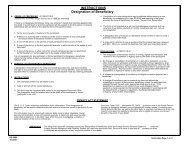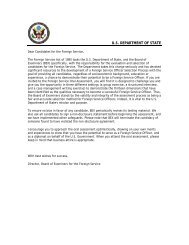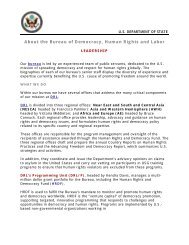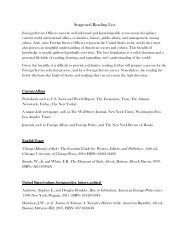Foreign Service Officer: ORAL ASSESSMENT STUDY GUIDE
Foreign Service Officer: ORAL ASSESSMENT STUDY GUIDE
Foreign Service Officer: ORAL ASSESSMENT STUDY GUIDE
You also want an ePaper? Increase the reach of your titles
YUMPU automatically turns print PDFs into web optimized ePapers that Google loves.
The Embassy of the United States of America<br />
Asima, Kuman<br />
MEMORANDUM<br />
TO:<br />
FROM:<br />
Members of the Working Group on Special Projects<br />
Science and Technology Office Manager – Todd Kowalski<br />
SUBJECT: Improved Wood Stove Project<br />
Science and Technology <strong>Officer</strong> Janice Springer just phoned to say she was on her way to the<br />
U.S. for a family emergency and will be unable to attend your meeting today. She has asked me<br />
to give you this outline of the essential elements of an improved wood stove proposal and offers<br />
social and ecological reasons for fully funding the project.<br />
Partners from the Middle East, Europe, and the United States have collaborated on this project to<br />
encourage widespread use of locally produced improved wood stoves that will reduce timber<br />
cutting, boost local employment, and preserve Kuman’s unique varieties of drought-resistant<br />
trees. The total cost of this one-year (or less) project is $375,000. The German NGO<br />
International Save the Forest Foundation (ISFF) will contribute $120,000 to cover two experts’<br />
salaries and expenses – one to teach stove building to local blacksmiths and the other to teach<br />
how to make metal flue liners and stove grates for this efficient stove. The Arab Fund for Local<br />
Initiatives will provide two project vehicles, including spare parts and maintenance ($60,000).<br />
The Peace Corps has committed two volunteers to help implement the project. ISFF has asked<br />
the Embassy for $195,000: (1) $80,000 for an office and training facilities; (2) $70,000 for tools<br />
and materials for training and an initial supply of metal for the blacksmiths; and (3) $45,000 for<br />
training aids, such as portable demonstration stoves.<br />
Ms. Springer strongly supports the project because it will relieve the heavy burden that<br />
maintaining daily cooking fires places on rural Kumani women. On average, a woman spends<br />
over three hours a day just trying to collect wood for cooking. That time only lengthens as<br />
nearby wood sources are used up. After finding the wood, the women then have to undertake the<br />
laborious process of turning wood into charcoal. The inefficiency of the traditional open fires<br />
forces the women to forage almost every day, since even a back-breaking load of wood will only<br />
produce enough charcoal for a day or two, and no woman can afford to spend all day building up<br />
a supply of wood with all the other duties expected of her. The new stoves would use much less<br />
wood and eliminate the need to go through the laborious step of making charcoal.








